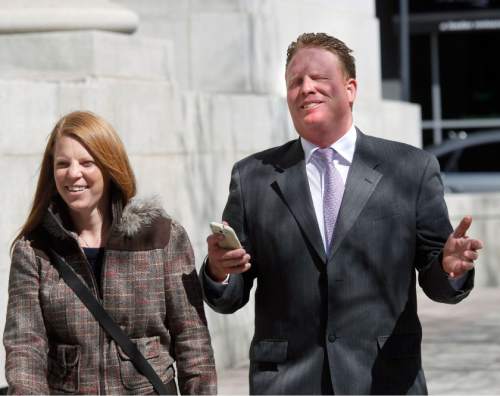This is an archived article that was published on sltrib.com in 2015, and information in the article may be outdated. It is provided only for personal research purposes and may not be reprinted.
A grand jury has issued a new indictment against St. George businessman Jeremy Johnson, eliminating most allegations that consumers were defrauded by websites set up by his online I Works marketing company.
Instead, the recrafted indictment — the fifth set of charges in the 4-year-old case — focuses on allegations of bank fraud, though prosecutors have acknowledged that no banks or credit-card processors lost money as a result of Johnson's actions.
The indictment handed up late Wednesday retains the 86 charges against Johnson and four other top I Works employees. The charges include bank fraud, participating in fraudulent banking activities, making false statements to a bank, conspiracy to defraud Wells Fargo Bank, conspiracy to commit money laundering, money laundering and aiding and abetting in a crime.
In a previous hearing in the case, Assistant U.S. Attorney Robert Lunnen said prosecutors, in anticipation of a trial, would clean up the indictment by dropping allegations of consumer fraud that came from a 2010 Federal Trade Commission lawsuit against Johnson, I Works and others, and instead zero in on bank fraud.
Johnson and the four other defendants are scheduled to enter pleas to the new indictment Friday in Salt Lake City's federal court. U.S. Magistrate Judge Paul Warner also wants to set a date for a trial, which had been scheduled for September but was postponed after Johnson got a new set of court-appointed attorneys.
Johnson and the other defendants previously have pleaded not guilty, and none accepted plea bargains recently offered by prosecutors.
The indictment centers around allegations that Johnson and the others set up a series of straw companies to continue to charge consumer credit and debit cards after I Works started to get cut off by credit-card companies because of excessive consumer demands for refunds.
Johnson previously has said that banks or their agents advised him on how to set up the companies to reduce fraud against I Works by affiliates, whom he blamed for the company's high chargeback rate.
Lunnen has said that the government concedes that no banks lost money in working with I Works. Instead, the government's case would rely on a theory of "intended loss." Under that part of the law, a defendant could be guilty for having designed a scheme meant to cause a loss, even if no actual loss occurred.
The FTC sued Johnson, I Works and other officers and businesses in December 2010 in Nevada, alleging I Works defrauded customers by offering them products for a nominal fee, but failing to adequately disclose that their credit or debit cards would be charged much larger monthly fees or other one-time charges.
Johnson and the others have denied those allegations. That case is set for trial Jan. 19 in Reno, Nev.
In a filing in the FTC case, Johnson and three other defendants, who are representing themselves, say that the court-appointed receiver, Robb Evans & Associates, had intentionally withheld emails found on the seized I Works computers that the defendants believe would vindicate them from wrongdoing in the criminal and civil cases.
The four said they inadvertently had obtained a report by a state investigator and FBI agents that reported that the receiver told them they had found 12 gigabytes of emails from Johnson and 18 gigabytes from defendant Bryce Payne. Yet prosecutors in the criminal case who obtained the emails from the receiver provided to the defense only seven gigabytes of Johnson's emails and 8.8 for Payne.
In another example of alleged misconduct, Johnson and three other defendants contend that an I Works computer server known as "Yellow," which they believe is "critical" to their defense, had been lost or destroyed. They claim, however, they found evidence that a copy of the server had been made but had not been provided to the defense in either case.
In addition, the motion contends the FTC manipulated and bullied two witnesses into signing affidavits that they have since repudiated.
Gary Caris, an attorney for the receiver, Robb Evans, said that based on a preliminary review of the motion, "the claims made by Mr. Johnson against the receiver are baseless. Most of these claims have been previously raised by Mr. Johnson and disproven. The receiver will be responding in detail to all of the claims in formal pleadings to be filed with the court."
Johnson is a central figure in the criminal cases pending in state court against former Utah Attorneys General John Swallow and Mark Shurtleff.



